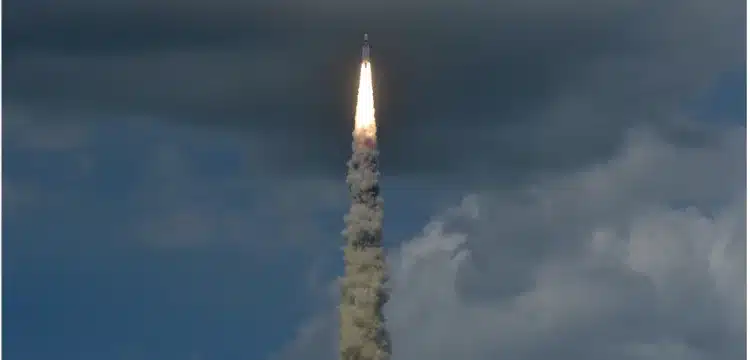[vc_row][vc_column][vc_column_text dp_text_size=”size-4″]India’s space agency, the Indian Space Research Organisation (ISRO), successfully launched a rocket on Friday, propelling a spacecraft into orbit and setting it on a trajectory towards a planned landing on the lunar south pole next month. This significant milestone, if achieved, would establish India as a major space power.
The LVM3 launch rocket took off from India’s main spaceport in Andhra Pradesh, leaving a trail of smoke and fire in its wake. After approximately 16 minutes, ISRO’s mission control confirmed that the rocket had successfully placed the Chandrayaan-3 lander into an Earth orbit, setting it on a course for a moon landing.
If successful, India would join an elite group of countries, including the United States, the former Soviet Union, and China, that have achieved controlled lunar landings. Notably, the Chandrayaan-3 spacecraft would be the first to land at the lunar south pole, an area of great interest to space agencies and private companies due to the potential presence of water ice, which could support future space missions and infrastructure.
Also Read: Yasir Nawaz Discusses Romance and Intrigue in ‘Dirilis Ertuğrul’
The launch, which was watched by over 1.4 million viewers on ISRO’s YouTube channel, marks India’s first major mission since the government announced initiatives to foster investment in space launches and satellite-based businesses. Prime Minister Narendra Modi expressed his support for the mission on Twitter, stating that it carries the hopes and dreams of the nation.
The previous Chandrayaan-2 mission in 2019 successfully deployed an orbiter but faced a crash landing with its lander and rover near the same area where Chandrayaan-3 aims to touch down. The new mission features a 2-meter-tall lander designed to deploy a rover near the lunar south pole, enabling a series of experiments over a two-week period.
The lunar landing of Chandrayaan-3 is scheduled for August 23, as announced by ISRO. This mission signifies India’s determination to play a leading global role in the evolving world scenario, as emphasized by Deputy Minister of State for Science and Technology Jitendra Singh.
The launch comes at a time when India has opened its doors to private launches, leading to a significant increase in the number of space startups. Last year, Skyroot Aerospace, backed by investors including Singapore’s sovereign wealth fund GIC, successfully launched India’s first privately built rocket.[/vc_column_text][/vc_column][/vc_row]











